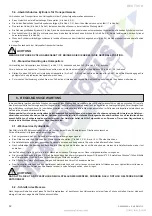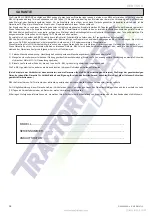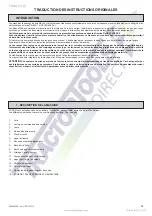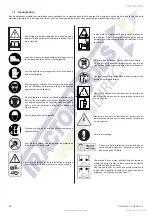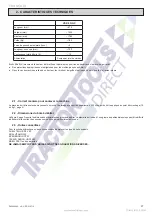
23
D22002600 - v.0 - UPD 210715
5.4 - Closing the cylinder for transport
Before lifting and moving the log splitter, the cylinder must be lowered as follows:
●
Position a piece of wood under the wedge, on the work surface (A in
fi
g.4, page 3)
●
Activate both the control levers (B in
fi
g.4, page 3) in order to lower the wedge completely (1 in
fi
g.9a).
●
Release the right lever (B in
fi
g.5, page 3) in order to hold the wedge in the reached position.
●
Remove the cylinder check pins (C in
fi
g.5) and put them in the appropriate holes on the two sides of the cylinder
●
Release also the left lever (A in
fi
g.5), therefore activate both the control levers upwards (B in
fi
g.9a, page 5), until they clamp, in order to close the
cylinder (2 in
fi
g.9a)
●
When the cylinder is completely closed and the wedge raised from the piece of wood (
fi
g.9b), bring the levers back to the neutral position
Now the log splitter can be lifted, moved and transported
WARNING
NEVER MOVE THE LOG SPLITTER WHEN THE CYLINDER IS LIFTED. THE MANUFACTURER IS NOT LIABLE FOR INJURY TO
PERSONS, ANIMALS OR OTHER THINGS CAUSED BY TRANSPORTING THE LOG SPLITTER WITH THE CYLINDER LIFTED.
5.5 - Manual handling of the log splitter
Before handling the log splitter, it is necessary to close the cylinder (1 in
fi
g.1, page 2) and to raise the foot (B in
fi
g.3, page 2).
Use the carrying handle on the top part of the mast (13 in
fi
g.1, page 2) for safe, trouble-free transport of the log splitter.
●
Rest one foot on the base of the log splitter (A in
fi
g.7, page 4). Pull the handle (B in
fi
g.7), tilting the machine towards you (
fi
g.9b, page 4) to faci-
litate transport.
●
To rest the machine on the ground, put one foot on the base and lower the machine carefully.
ENGLISH
6 - ROUTINE MAINTENANCE
This chapter describes routine maintenance, i.e. operations carried out by the operator, on the log splitter to keep it in perfect working order and therefore
reliable for continuous, long-term use. All routine maintenance operations must be carried out with the machine off and in the case of log splitters with
electric motor with the power cable disconnected.
Any other maintenance operation not specifi cally envisaged in this manual must be carried out by authorised personnel only in that hazar-
dous situations may arise for which the operator is not prepared.
In the case in which extraordinary maintenance or part replacement operations are not carried out by authorised personnel, the guarantee
shall be immediately null and void and the manufacturer shall be relieved of any responsibility for injury to persons or animals or damage.
6.1 - How to change the hydraulic oil
The spent oil must be replaced with new oil of the type indicated on page 19 every 600 hours of operation. To change the oil, proceed as follows.
●
Make sure that the wedge of the machine is fully retracted.
●
Place a 15 litre capacity receptacle under the oil drainage plug, located under the oil tank (C in
fi
g.3, page 2).
●
Unscrew the drainage plug with a suitable wrench and let all the oil in the tank drain into the receptacle.
●
Once the tank is empty, clean the inlet and the drainage plug with petrol and then replace the drainage plug, drawing this up tightly.
Refer to the table on page 19 for the correct amount of oil and then proceed as follows:
●
Remove the oil plug (A in
fi
g.3, page 2),
fi
ll the tank with the correct oil (section "2.3 - Recommended oils") and check the right quantity of oil using
the oil rod (A in
fi
g.3). The oil level must be between the two notches on the oil dipstick
●
Clean the inlet of the oil plug and replace the plug.
●
Activate the log splitter and let the wedge make some strokes in order to let any air bubble come out from the circuit.
At the end, bring the wedge back to the upper position, ready to work
WARNING:
NEVER MIX OIL WITH GENERAL WASTE!
USED OIL MUST BE DISPOSED OF ACCORDING TO CURRENT REGULATIONS IN THE COUNTRY WHERE THE MACHINE IS USED.
6.2 - Sharpening the wedge
After long periods of operation and when required, sharpen the wedge of the log splitter using a
fi
ne-toothed
fi
le and taking care to remove any burrs
or crushed parts of the metal.
























